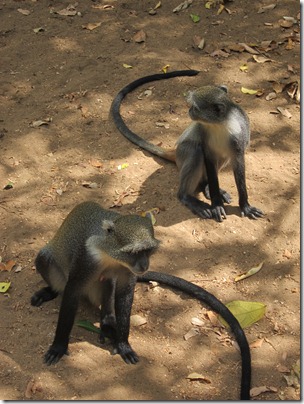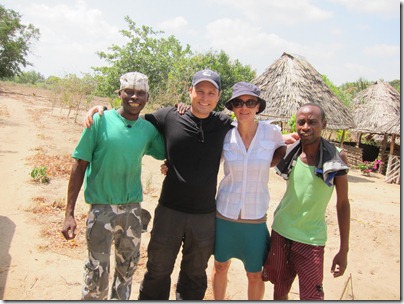Most people come to Kenya to see the Big 5: Lions, Buffalos, Elephants, Leopards and Rhinos, but during our trip down the east coast of Kenya, it has been the small things that have amazed us the most.
 No big game at Mida Creek, but we were equally delighted (and camera ready) to find our own little five: baboon, frog fish, fiddler crab, bee eater and Gary gecko, our nightly dinner entertainment.
No big game at Mida Creek, but we were equally delighted (and camera ready) to find our own little five: baboon, frog fish, fiddler crab, bee eater and Gary gecko, our nightly dinner entertainment.
Mida Creek Eco Camp was also one of those small things. As previously posted, it is a small camp, established and run by the local Giriama tribe. Proceeds from the camp support two teachers at the local school. I would hazard a guess that the energy and enthusiasm of the community towards their small home grown venture would be hard to replicate in a big NGO initiative. After arriving in big, hectic Mombasa on Wednesday, we have come to appreciate the small places we have seen even more. [A teaser for our next Mombasa post: what happens when you put 2 fresh-off-the bus Mazungus (that’s us) in a tiny tuk-tuk stuffed with a driver, one ride –along and a really ineffective would-be scam artist?]
It seems like every place we have gone so far, we have met a few people, whose stories resonated with us. At Mida Creek, it was Mateso and Eriki, two Giriama employees at the camp. Mateso was our smiley waiter, tour guide, fireside story teller and all-round-buddy at the camp. We swapped many stories with Mateso, the most applicable to us being Giriama wedding customs:
Mateso – First, if you like the girl, you meet with the her family and decide on the dowry
Us – Oh wow, how much would a dowry be?
Mateso – Something like some goats, coconut wine and some money. [At this point I’m eyeing Ryan wondering if that sounds a little more appealing than having to cough up an engagement ring.] Once the dowry is settled, you decide on night and secretly go to the girls house and steal her – she is ready with her things. The next morning the family finds that she is gone…
Us –And then you’re married?
Mateso – And then you’re married.
[Side note: being in the middle of wedding planning this sounds like a nice, romantic alternative…minus the goats.]
Anyway, after trading many stories you forget how different your lives really are. We started talking about the drought that has affected Kenya this year, and Mateso told us that growing up, he always remembers a few months of the year where you would go without food. You would have to occupy yourself with other things or else the hunger will make you crazy.
Eriki was the second employee we had a chance to chat with. He was only able to start Standard 9, without paying, because of his good grades (school is free in Kenya from Standard 1 to 8, after that school fees and uniforms are the students responsibility). He became sick and had to leave school for 3 weeks. When he returned, he failed a test due to his absence and because of the failing grade was asked to either pay his fees or leave the school – no second chances. We asked how much it was – 20,000 Kenyan shillings a semester…I was thinking that was $2,000 Cdn but after a bit more thought (rusty math of the unemployed), realized it was $200 Cdn, the cost of one fancy meal at home. To me, the most unfair part of this story is that Ryan and I, on a whim, could pay for him to finish school. A decision left to people he doesn’t know and has no control over.
 Despite the sad stories, the Eco Camp is very promising for this community. We were speaking to Mateso the day we left, and they are planning to expand the camp by building a volunteer hut and a small medical clinic, so that mothers won’t have to walk 5 km to the overcrowded clinic in Gede. All of these small things have made a big difference at Mida Creek…we can’t wait to see what this little place does next!
Despite the sad stories, the Eco Camp is very promising for this community. We were speaking to Mateso the day we left, and they are planning to expand the camp by building a volunteer hut and a small medical clinic, so that mothers won’t have to walk 5 km to the overcrowded clinic in Gede. All of these small things have made a big difference at Mida Creek…we can’t wait to see what this little place does next!
For more information about Mida Creek Ecocamp: http://www.midaecocamp.com/
Thanks for sharing Michelle – great to be able to follow you guys around! xo